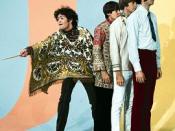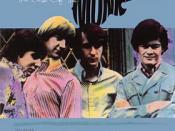The worldÃÂs interest in rock and roll was growing, and by 1970, it had become an object of much commentary and criticism. Some of this criticism was favorable and some was not. If one thing was for sure, it was that critics did not hold back when giving their opinion about an artist.
In an article from esquire magazine, Robert Christgau discusses his thoughts on the Monkees. The Monkees were a pop singing foursome assembled to star in the television series also entitled ÃÂThe MonkeesÃÂ from 1965-1968. The primary members were Micky Dolenz, Davy Jones, Michael Nesmith, and Peter Tork. Christgau described the Monkees as a ÃÂwholesome American substitute for the Beatles.ÃÂ (p. 215) He believed that serious fans of rock and roll didnÃÂt like them not because they disliked the music but because they were brought together to make a television show. However, Christgau thinks they are pretty good; ÃÂbetter than what makes up much of the top ten.ÃÂ
(p.215) He thinks they have potential to improve, but will be nothing neat what their look-alikes, the Beatles, are. Six months later, Christgau released a follow up article on the Monkees. He writes about how the Monkees ÃÂÃÂ took a big gamble by releasing an album and a single at about the same time as the big fellas from England.ÃÂ Headquarters, the MonkeesÃÂ new album, released at around the same time as Sgt. PepperÃÂs Lonely Hearts Club Band by the Beatles, does not sell well at all. Christgau believes that the band has somewhat improved musicians, but then goes on to talk about how he saw their set at Forest Hills and it was awful. ÃÂÃÂ the act was unbelievably corny. The kids screamed, of course, but the stadium was far from full, and the one lonely rush at the stage quickly stymied by a bored and overstaffed security force. Good signs.ÃÂ (p. 215)Lester Bangs was a music critic who wrote for both ÃÂCreemÃÂ and ÃÂRolling StoneÃÂ magazines. He was a man who enjoyed the simplistic and non-pretentious side of music. He was a big fan of the Stooges, whose music he described as monotonous and simplistic on purpose,ÃÂ and thought that they ÃÂwork deftly with musical ideas that may not be highly sophisticated but are certainly advanced.ÃÂ (p.232) Bangs wrote that the ominous and mindless pulsations that arose from simple two-chord guitar lines were an ÃÂeffective hypnotic counterpoint to the sullen plaint of Iggy PopÃÂs words.ÃÂ (p. 232) He thought that Iggy, who was the Stooges front man, wrote some of the best lines in rock and roll.
Bangs made a very interesting observation about rock in the 70ÃÂs. He stated that, ÃÂÃÂ a decided majority of the rising bands were composed of ex-folkies, as opposed to previous waves whose roots had lain in 50s rock and R&B but never crossed paths with the college mobs of coffee house banjo-pickers who almost unanimously, from Kingston Trio frat sweaters to hip Baez\LightninÃÂ Hopkins ÃÂpurists,ÃÂ looked down their noses at that ugly juvenile noise called rock nÃÂ roll which they all presumed to have grown out of into more esthetically rewarding tastes.ÃÂ (p.234) Bangs liked some of these bands who were made up of ÃÂex-folkies,ÃÂ such as the Byrds and Airplane, but was always a bigger fan of more ÃÂnoisyÃÂ artists like Little Richard, Cecil Taylor, John Cage, the Stooges and the Yardbirds.
James Taylor is a singer-songwriter who was born on March 12, 1948 in Boston Massachusetts. He was a very popular artist in the 1970ÃÂs and is known for his gentle and sensitive songs. Time Magazine describes him as a man who is driven by many idealistic contemporary concerns; concerns such as the misuse of nature, the manipulation of people, and the evils of wealth. He was once quoted saying, ÃÂNothing is wrong with making as much bread as you need, but there are things wrong with making more bread than you need,ÃÂ and ÃÂI like success almost as much as I dislike it (p.241). Time magazine writes a very favorable critique of his music in which they say that ÃÂhis guitar fingering lends sudden lights and shadows to the barest melody,ÃÂ and that his music is ÃÂa fusion of the three black and white mainstreams of pop. The lonely twang of country, the pithy narrative of folk, and the rhythmic melancholy of the blues.ÃÂ (p.239) Fans like Taylor because they can relate to him. He sings mostly about ÃÂhead problems,ÃÂ something that everybody has, and that things like money, good health, a good education, or a loving family donÃÂt seem to prevent (and in some cases even make worse.) Drugs, thoughts of suicide, alienation, under-achievement; these are all things that James Taylor and his fans have all dealt with or currently are dealing with.
Greil Marcus was a very popular music journalist in the 1970ÃÂs who once said, ÃÂThe best pop music does not reflect events so much as it absorbs them.ÃÂ (p.249) He thought that the best bands had a way of connecting with their audience to get their message across. In his book, ÃÂMystery Train: Images of America in rock and roll music,ÃÂ he talks about Sly StoneÃÂs new album, ÃÂRiot.ÃÂ He described it as scary and immobile, and said that it wore down other records, turning them into unintentional self-parodies. ÃÂIf the spirit of SlyÃÂs early music combined the promises of Martin Luther King speeches and the fire of a big city riot, ÃÂRiotÃÂ represented the end of those events, and the attempt to create a new music appropriate to new realities. The negative of ÃÂRiotÃÂ is enough to make solutions seem trivial and alternatives false, in personal life, politics, or music.ÃÂ (p.249)Led Zeppelin, who is considered by many to be one of the greatest bands of all time, did not receive 100% rave reviews when they first started out. John Mendelsohn, a critic for Rolling Stone, describes the bands lead guitarist Jimmy Page as a great blues player, but a weak and unimaginative songwriter, and that the bandÃÂs debut album really suffered because of this. He calls Robert Plants voice ÃÂstrained and unconvincing,ÃÂ and wonders why they would ÃÂÃÂ waste their considerable talent on unworthy material.ÃÂ (p.268) Talking about ZeppelinÃÂs song ÃÂBabe IÃÂm Gonna Leave You,ÃÂ Mendelsohn writes that itÃÂs repetitive and dull (especially PlantÃÂs voice) and that its not worth the 6 and a half minutes that Zeppelin gave to it.
In an interview with Dave Schulps, a writer for the Trouser Press, Jimmy Page discusses some of the feedback he and the rest of Zeppelin had received during the releases of their first few albums. There was a bit of a fuss made about Zeppellin ÃÂÃÂ using traditional and blues lyrics and tunes and calling them their own.ÃÂ (Schulps, p. 272) In response to this Page says, ÃÂThe riffs were totally different from the ones that had come beforeÃÂ People say ÃÂoh, Bring It On Home was stolenÃÂ Christ, thereÃÂs only a tiny bit of that taken from Sonny Boy WilliamsonÃÂs version and we threw that in there as a tribute to him.ÃÂ Page didnÃÂt take bad reviews too hard. When asked about them he would reply, ÃÂI just thought they (the critics) hadnÃÂt understood it, hadnÃÂt really listened to it.ÃÂ (p.272) For example, Melody Maker, a British music newspaper, wrote that Zeppelin had broke out their acoustic guitars just because Crosby Stills and Nash had just come through the U.K. Page was happy when, around the time of the release of the bandÃÂs fourth LP, people began to realize that they werenÃÂt just messing around.
The 1970ÃÂs was one of the most prolific times in history for rock and roll. The wide array of styles and talents that emerged brought about an even wider array of opinions from critics, the public, and the artists themselves. ItÃÂs really amazing to see how some bands who are now considered to be some of the best there ever were received awful reviews when they first came on the scene. Everyone is entitled to their own opinion, and hearing a wide range of beliefs and viewpoints is very helpful in understanding any topic, and this is no different when it comes to rock and roll.
Bangs, Lester. ÃÂOf Pop Pies and Fun,ÃÂ from Psychotic Reactions and Carburetor Dung. The Estateof Lester Bangs, 1987Bracket, David. The Pop, Rock, and Soul Reader: Histories and Debates. New York: Oxfor UniversityPress, 2005Christgau, Robert. ÃÂAny Old Way You Choose It: Rock and Other Pop Music.ÃÂ Esquire. June 1967, Dec.
1967: 38-39, 47-48ÃÂJames Taylor: One ManÃÂs Family of Rock.ÃÂ Time Magazine 1 Mar. 1971: 45-48Marcus, Greil. ÃÂSly Stone: The Myth of Staggerlee ÃÂ from Mystery Train: Images of Americain Rock and Roll Music. New York: Plume, 1975Mendelsohn, John. ÃÂRecord Review of Led Zeppelin.ÃÂ Rolling Stone 15 Mar. 1969Schulps, Dave. ÃÂThe Crunge: Jimmy Page Gives a History Lesson.ÃÂ Trouser Press. Sept. 1977: 21-23



